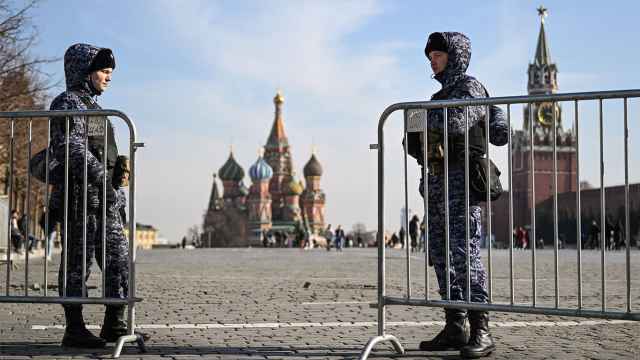Foreign Minister Sergei Lavrov said Monday that he would press European Union diplomats next weekend over why the EU has dragged out the process of introducing visa-free travel with Russia.
Lavrov, who made his comments at a far-ranging meeting with foreign investors, spoke as the Culture Ministry announced plans that would allow foreigners to visit without visas for up to 72 hours if they were en route to a third country.
Lavrov said he would seek assurances during a meeting in Luxembourg on Oct. 14 that the EU wasn’t slowing down the talks on purpose.
“The information is coming to us that the main reason is political,” he said at the gathering of the Association of European Businesses.
Lavrov said he had heard that a stumbling block was the desire among some EU members states to grant visa-free travel to citizens of the Eastern Partnership countries before the Russians. Under the partnership, the EU links financial and other assistance to six former Soviet republics — Armenia, Azerbaijan, Belarus, Georgia, Moldova and Ukraine — to democratic and economic reforms.
Lavrov said that if the whole of the EU was blocking Russia’s visa request over the objections of a few countries, it would be “a rather perverse interpretation of solidarity,” according to comments carried by Interfax.
"If this is so, it is a purely politicized approach that does not take into account what Russia has actually done to ensure the safety of a visa-free regime," he said.
He vowed to seek concrete action from the EU’s 27 foreign ministers and Catherine Ashton, the EU’s foreign affairs representative, during their weekend talks.
“I want to talk about it, and I want to hear some assurances that our suspicions are unfounded," he said. "I also want to see some steps to allay these suspicions, not just words but actions.”
The EU has said it is ready to discuss visa-free travel, but Russia must first meet a checklist of issues, including new border controls and the introduction of biometric passports.
The Kremlin has made visa-free travel a priority in its talks with the West and secured some eased rules, such as three-year visas with the U.S. that went into force on Sept. 9. Those new regulations, which were initiated by the U.S. side, took two years to achieve.
On the ground, however, the authorities have not always been so welcoming. On Monday, an Estonian citizen who flew to St. Petersburg to attend a conference about eased visa rules was denied entry at the airport. Yevgeny Krishtafovich, head of an Estonian youth group called Open Republic, told Estonian media by phone from the Pulkovo Airport that the border guards had offered no reason for barring him from Russia.
Krishtafovich had planned to attend a forum dedicated to visa-free travel between Russia and the European Union.
Krishtafovich added, however, that Russian diplomats had indicated to him at previous forums that they disapproved of his organization’s insistence that an eased visa regime with the EU should be linked to an improvement in Russia’s human rights record.
Meanwhile, Culture Minister Vladimir Medinsky, speaking during a committee session at the Federation Council, said his ministry hoped to boost tourism by drafting legislation that would allow foreigners visiting Moscow, St. Petersburg or Kazan to stay for up to 72 hours without visas.
The relaxed rules, he said, would apply to all foreigners and, for example, “a Japanese tourist in transit to Rome could stop by the Bolshoi Theater,” Interfax reported.
Medinsky estimated that 500,000 foreigners a year would take advantage of the opportunity to visit briefly while en route to another country.
"And imagine if each one of them spent at least $500 — what a profit this would be," he said.
His proposal is separate from a 10-day visa-free plan that would allow foreigners to attend cultural and sports events, Rossiisskaya Gazeta reported.
Related articles:
A Message from The Moscow Times:
Dear readers,
We are facing unprecedented challenges. Russia's Prosecutor General's Office has designated The Moscow Times as an "undesirable" organization, criminalizing our work and putting our staff at risk of prosecution. This follows our earlier unjust labeling as a "foreign agent."
These actions are direct attempts to silence independent journalism in Russia. The authorities claim our work "discredits the decisions of the Russian leadership." We see things differently: we strive to provide accurate, unbiased reporting on Russia.
We, the journalists of The Moscow Times, refuse to be silenced. But to continue our work, we need your help.
Your support, no matter how small, makes a world of difference. If you can, please support us monthly starting from just $2. It's quick to set up, and every contribution makes a significant impact.
By supporting The Moscow Times, you're defending open, independent journalism in the face of repression. Thank you for standing with us.
Remind me later.





